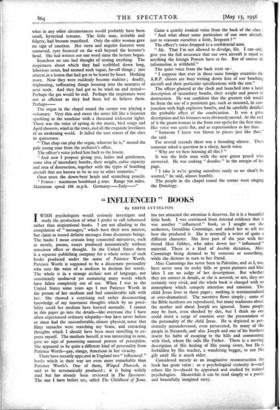" INFLUENCED " BOOKS
By EDITH LYTTELTON
IWISH psychologists would seriously investigate and study the production of what I prefer to call influenced rather than inspirational books. I am not alluding to the compilation of " messages," which have their own interest, but claim to record definite messages from discarnate beings. The books I mean contain long connected narratives, such as novels, poems, essays produced automatically without conscious effort or thought. In the United States there is a separate publishing company for a whole series of such books produced under the name of Patience Worth. Patience Worth is supposed to be a discarnate personality who uses the voice of a medium to declaim her words. The whole is in a strange archaic sort of language, not consistently mediaeval yet containing many words which have fallen completely out of use. When I was in the United States some years ago I met Patience Worth in the person of her medium and had considerable talk with her. She showed a surprising and rather disconcerting knowledge of my innermost thoughts which by no possi- bility could her medium have learned normally. I cannot in this paper go into the details—like everyone else I have often experienced ordinary telepathy—but have never before or since had the uncomfortable, almost physical, sense that filmy tentacles were searching my brain, and extracting thoughts which I should have been most unwilling to ex- press myself. The medium herself, it was interesting to note, gave no sign of possessing unusual powers of perception. She appeared to be quite a different kind of personality from Patience Worth—gay, slangy, American in her vivacity.
There have recently appcared in England two " influenced " books which in their way are even more remarkable than Patience Worth's. One of them, Winged Pharaoh, is said to be automatically produced ; it is being widely read but has already been reviewed in The Spectator. The one I have before me, called The Childhood of Jesus. has not attracted the attention it deserves, for it is a beautiful little book. I was convinced from internal evidence that it was another " influenced " book, so I sought out the authoress, Geraldine Cummings, and asked her to tell me how she produced it. She is normally a writer of quite a different character. She lives part of the year with her friend Miss Gibbes, who takes down her " influenced " material. There is a kind of double dictation, Miss Cummings being dictated to by someone or something, while she dictates in turn to her friend.
Miss Cummings has never been in Palestine, and as I, too, have never seen its rocky hills or green pastures and blue lakes I am no judge of her descriptions. But whether they are correct in details, as she is assured, or not, they are certainly very vivid, and the whole book is charged with an atmosphere which compels attention and emotion. The child Jesus lives in these pages ; nothing is sentimentalised or over-dramatised. The narrative flows simply ; some of the Bible incidents are reproduced, but many traditions about the mother and about Joseph are ignored. Some people may be hurt, even shocked by this, but I think no one could resist a surge of emotion over the presentation of the personality of the child Jesus. He is depicted as per- sistently misunderstood, even persecuted, by many of the people in Nazareth, and also Joseph and one of his brothers resent his habit of escaping to the hills and communing with God, whom He calls His Father. There is a moving description of His healing of His young sister, but He is forbidden by His teacher, a wandering beggar, to use His gift until He is much older.
Considered merely as an imaginative reconstruction the book has great value : as a psychological curiosity it—and others like it—should be appraised and studied by trained psychologists. Meanwhile it can be read simply as a poetic and beautifully imagined story.














































 Previous page
Previous page